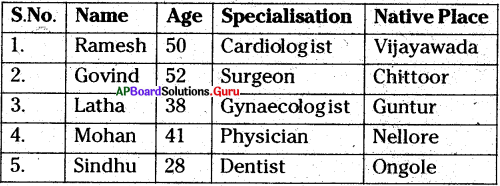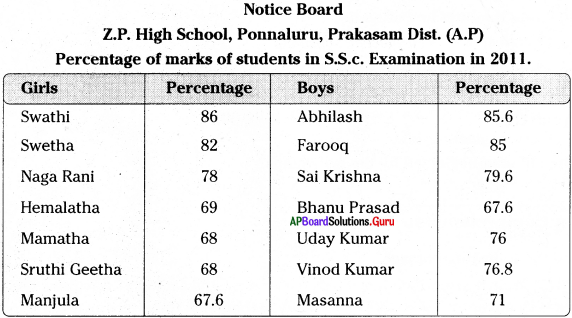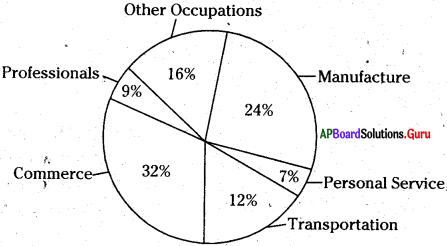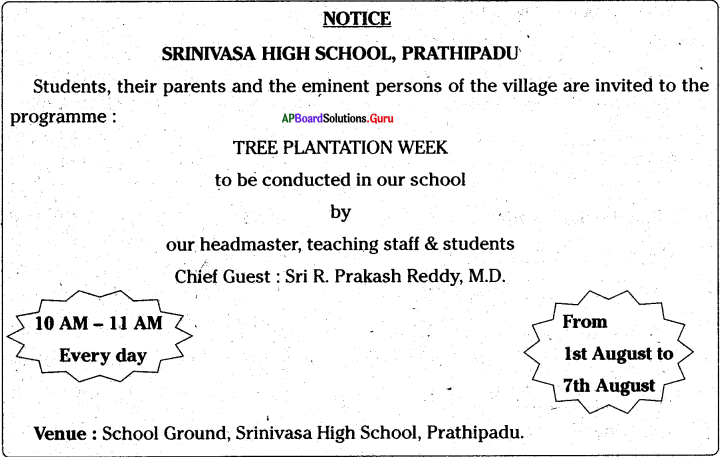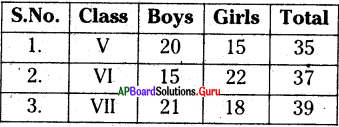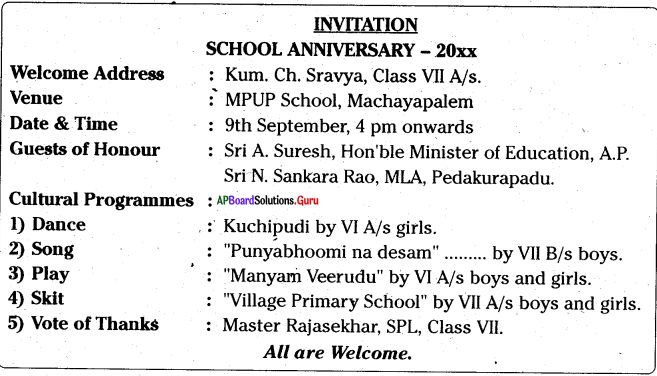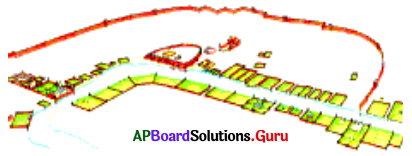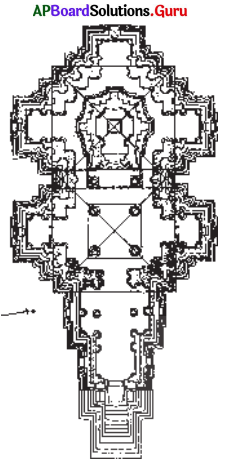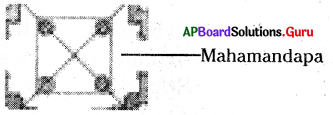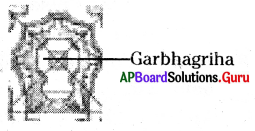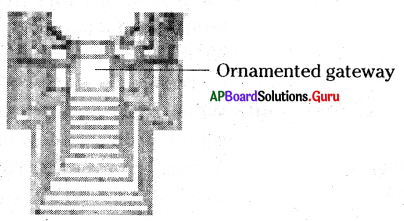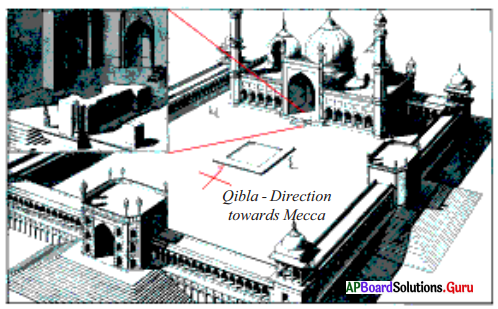These AP 7th Class Telugu Important Questions 8th Lesson నిజం-నిజం will help students prepare well for the exams.
AP State Syllabus 7th Class Telugu 8th Lesson Important Questions and Answers నిజం-నిజం
7th Class Telugu 8th Lesson నిజం-నిజం Important Questions and Answers
I. అవగాహన – ప్రతిస్పందన
ఈ కింది పరిచిత గద్యాలను చదవండి ఇచ్చిన ప్రశ్నలకు జవాబులు రాయండి.
1. మధ్యమధ్య వీడు ఏవో కుర్రతనపు చేష్టలు చేస్తుంటాడు. ఎంతో జాగ్రత్తగా కనిపెట్టి చూస్తూ ఉన్నా, మొన్న దసరా సెలవులకు ఇంటికి వెళ్ళాడు, వెళ్ళినవాడు స్కూలు తెరవటంతోనే రాక నాలుగు రోజులు ఆలస్యంగా వచ్చాడు. ఎందుకురా ఇంత ఆలస్యంగా వచ్చావు అని అడిగితే, “నాన్న ఉండమన్నాడు మామయ్యా”, అన్నాడు. సెలవు చీటీ తెచ్చావురా అంటే తెచ్చానుగాని ఎక్కడో పారవేశానన్నాడు. నిజమో, అబద్దమో, చెప్పలేనుగాని మొత్తంమీద వాడు అబద్దాలు ఆడుతున్నాడని మాత్రం నాకు అనుమానం కలిగింది.
ప్రశ్నలు:
అ) మధ్యమధ్యన ఏ చేష్టలు చేస్తున్నాడు?
జవాబు:
మధ్యమధ్యన కుర్రతనపు చేష్టలు చేస్తున్నాడు.
ఆ) ఏ సెలవులకు ఇంటికి వచ్చాడు?
జవాబు:
దసరా సెలవులకు ఇంటికి వచ్చాడు.
ఇ) ఎన్ని రోజులు ఆలస్యంగా వచ్చాడు?
జవాబు:
నాలుగు రోజులు ఆలస్యంగా వచ్చాడు.
ఈ) ఎటువంటి అనుమానం కలిగింది?
జవాబు:
అబద్దం ఆడుతున్నాడని అనుమానం కలిగింది.
![]()
2. తమాషాగా ఆరోజు సాయంత్రమే బజారులో హఠాత్తుగా మా రంగయ్య కనపడ్డాడు. ఆయన ఏదో తొందర పనిమీద బెజవాడ వెడుతున్నాడు. మేమిద్దరం కొంచెంసేపే మాట్లాడాం. పిల్లవాడి చదువు సంగతీ అదీ వచ్చింది. చదువు ఎల్లా ఉన్నా, కుర్రవాడు చెడ్డసహవాసాలు చేస్తున్నట్లు నాకు అనుమానంగా ఉందని కూడా చెప్పాను. ఆయన నాచెయ్యి పట్టుకొని “కుర్రవాడిని బాగుచేసే బాధ్యత నీదిరా అబ్బాయి. మరి నీ ఇంట్లో ఉంచింది. ఎందుకూ! కాస్త మంచీ చెడ్డా చూస్తావనికదూ! వాడిని ఒకదారిని పెట్టాలినీవు. పన్నెండేళ్ళ వెధవ. ఇప్పుడే నీవు వాడిని సన్మార్గంలోకి దింపు. అంతా నీదే భారం”, అంటూ బస్సు ఎక్కాడు.
ప్రశ్నలు
అ) రంగయ్య హఠాత్తుగా ఎక్కడ కనిపించాడు?
జవాబు:
రంగయ్య హఠాత్తుగా బజారులో కనిపించాడు.
ఆ) కుర్రవాడు ఏ సహవాసం చేస్తున్నాడని అనుమానం వచ్చింది?
జవాబు:
కుర్రవాడు చెడ్డ సహవాసం చేస్తున్నాడని అనుమానం వచ్చింది.
ఇ) ఏ మార్గంలో దింపాలి?
జవాబు:
సన్మార్గంలో దింపాలి.
ఈ) రంగయ్య తొందర పనిమీద ఎక్కడికి వెళ్ళాడు?
జవాబు:
రంగయ్య తొందర పనిమీద బెజవాడ వెళ్ళాడు.
3. ఒక్క విషయంమటుకు తేలిపోయింది. శీను అబద్దం ఆడాడు. రేపు ఇంకా ఎన్ని అయినా ఆడుతాడు! దాని తరువాత దొంగతనాలు నేర్చుకొంటాడు! ఇక ఆపైన స్కూలు ఎగగొట్టి ఎందుకూ పనికిరాకుండా పాడయిపోతాడు. ఏదో కాస్త గట్టి ఏర్పాటుచెయ్యాలి. చెయ్యి చేసుకోవలసిన అవసరం ఉండదనుకొంటాను. శీను ఇంకా భయభక్తులలోనే ఉన్నాడు. ఈ దఫా గట్టిగా చీవాట్లు వేస్తే చాలుననుకొన్నాను. నేను ఇంటికి వెళ్ళటంతోనే “ఒరే, శీనూ, మీ నాన్న కనపడ్డాడు. నిన్ను రమ్మనలేదుట! అబద్దాలాడుతున్నావు! వెధవా!” అని కోప్పడలేదు. ఏమి జరుగుతుందో, ఇంకా ఏమంటాడో చూద్దామని ఊరుకొన్నాను.
ప్రశ్నలు:
అ) అబద్దం ఆడింది ఎవరు?
జవాబు:
అబద్దం ఆడింది శీను.
ఆ) ఏది చేసుకోవలసిన అవసరం ఉంది.
జవాబు:
చేయి చేసుకోవలసిన అవసరం ఉంది.
ఇ) శీను ఇంకా ఎలా ఉన్నాడు?
జవాబు:
శీను ఇంకా భయభక్తులతో ఉన్నాడు.
ఈ) వేటిని వేస్తే చాలనుకున్నాడు?
జవాబు:
గట్టిగా చీవాట్లు వేస్తే చాలనుకున్నాడు.
![]()
4. కింది పరిచిత గద్యాన్ని చదివి, ఇవ్వబడిన ప్రశ్నలకు జవాబులు రాయండి.
శీనుకు పశ్చాత్తాపం కలిగినట్లు నాకు బాగా నమ్మకం కలిగింది. ఇక వాడు ఎప్పుడూ అబద్ధం చెప్పడు. ఒక కుర్రవాడిని సన్మార్గంలోకి తిప్పగలిగానని నాకు చాలా సంతోషం కలిగింది. కాని ఒక్క విషయం నన్ను చాలా బాధ పెట్టింది. వాడు ఇన్ని అబద్ధాలు ఎందుకు ఆడినట్లు ! ఈ ప్రశ్నకు సమాధానం కోసం నేను చాలా సేపు ఆలోచించాను. ఇంటికి వెళ్ళాలని ఆదుర్దాపడి ఉంటాడు. అంతకు పూర్వం నాలుగు రోజుల క్రితమే పది రోజులు తల్లిదండ్రుల దగ్గర ఉండి వచ్చినవాడికి, అంత ఆరాటం ఎందుకో వాడినే అడగాలని అనుకొన్నాను. పది గంటలకు శీను గదిలోకి వెళ్ళాను. వాడు ఖిన్నుడై కుర్చీలో కూర్చుని ఏదో పుస్తకం వంక చూస్తున్నాడు. నేను వెళ్ళగానే లేచి నుంచున్నాడు. వాడి మీద చెయ్యివేసి మెల్లగా వాణి నాగదిలోకి నడిపించుకొని వచ్చి, కుర్చీలో కూర్చోబెట్టి, బుజ్జగించి అడిగాను.
ప్రశ్నలు:
1. రచయితకు ఎందుకు సంతోషం కలిగింది?
జవాబు:
ఆ కుర్రవాడిని సన్మార్గంలోకి తిప్పగలిగానని.
2. రచయితకు బాధ కలిగించిన విషయం ఏది?
జవాబు:
అబద్ధాలు ఆడటం.
3. శీను అబద్దం ఆడి ఎక్కడికి వెళ్ళి వచ్చాడు?
జవాబు:
తల్లిదండ్రుల దగ్గరకు వెళ్ళి వచ్చాడు.
4. పై పేరా ఆధారంగా ఒక ప్రశ్న తయారు చేయండి.
జవాబు:
ఎక్కడికి వెళ్ళాలని ఆదుర్దా పడ్డాడు?
5. కింది పరిచిత గద్యాన్ని చదివి, ఇవ్వబడిన ప్రశ్నలకు జవాబులు రాయండి.
శీను విషయమే ఆలోచిస్తూ నడుస్తున్నాను. వీణ్ణి ఇక జన్మలో అబద్దం ఆడకుండా చెయ్యాలి. బహుశః వాడు ఆ నిశ్చయానికే వచ్చివుంటాడని తోచింది. కాని వాడెవరో ఆ సీతన్న స్నేహంలో పడ్డాడో ! నేను చేసిన పని అంతా వ్యర్థమైపోతుంది. అందుకని ఆ సీతన్నతో ఇకముందు ఎప్పుడూ కూడా సహవాసం చెయ్యవద్దని గట్టిగా చెప్పితే, నేను ఈ కుర్రవాడిని బాగుచేసినవాడిని అవుతానని అనుకొన్నాను. అందుకని అన్నాను. ‘ఒరే శీనూ, నీవు ఇకనుంచి బుద్ధిమంతుడివిగా ఉండాలి. ఆ సీతన్న వర్డి వెధవ ! వీధులవెంట తిరిగే వెధవ ! వాడు వట్టి అబద్ధాలకోరు. వాడు మీవూరువాడు అయినాసరే ఎప్పుడుగాని వాడితో మాట్లాడకు. ” “అదికాదు మామయ్యా !”. “ఏది కాదురా వెధవా ! సీతన్నను నేను ఎరగననుకొన్నావా ?”
ప్రశ్నలు :
1. మామయ్య ఎవరి విషయం ఆలోచిస్తూ నడుస్తున్నాడు?
జవాబు:
శ్రీను విషయం
2. శీనును ఎవరితో స్నేహం చేయవద్దని మామయ్య అంటున్నాడు?
జవాబు:
సీతన్నతో
3. “నీవు ఇక నుంచి బుద్ధిమంతుడిగా ఉండాలి” అని ఎవరన్నారు?
జవాబు:
మామయ్య
4. పై పేరా ఆధారంగా ఒక ప్రశ్న తయారు చేయండి.
జవాబు:
‘వర్ధి’ అంటే ఏమిటి?
![]()
ఈ క్రింది అపరిచిత గద్యాలను చదివి, ఇచ్చిన ప్రశ్నలకు జవాబులు రాయండి.
1. ఆరోగ్య పరిరక్షణకు మహిళలు ప్రత్యేక శ్రద్ధ తీసుకోవాలి. 35 ఏళ్ళు దాటాక మరింత జాగ్రత్తగా ఉండాలి. కుటుంబానికి ఆయువు పట్టు మహిళలే. మహిళ ఆరోగ్యంగా ఉంటేనే ఆ కుటుంబం ఆరోగ్యంగా ఉంటుంది. ఆసుపత్రికి వెళ్ళి పరీక్షలు చేయించుకోవాలి. దానివలన రుగ్మతలను ముందుగానే తెలుసుకోవచ్చును. వ్యాధులు ముదిరిన తర్వాత తెలుసుకొంటే వైద్యం కష్టమవుతుంది.
ప్రశ్నలు:
అ) ఏ వయసు మహిళలు ఆరోగ్యం గురించి చాలా జాగ్రత్తగా ఉండాలి?
జవాబు:
35 సం||లు దాటినవారు ఆరోగ్యం గురించి చాలా జాగ్రత్తగా ఉండాలి.
ఆ) కుటుంబానికి ఆయువు పట్టు ఎవరు?
జవాబు:
మహిళ కుటుంబానికి ఆయువు పట్టు.
ఇ) “రుగ్మత” అంటే అర్థం ఏమిటి?
జవాబు:
రుగ్మత అంటే రోగం అని అర్థం.
ఈ) వ్యాధులు ముదిరితే ఏమవుతుంది?
జవాబు:
వ్యాధులు ముదిరితే వైద్యం దొరకడం కష్టమవుతుంది.
2. మానవాళికి ప్రాణాధారమైన నీటిని కాపాడుకోవాలి. ప్రతి ఒక్కరూ బాధ్యతగా నీటిని కాపాడుకోవాలి. దీని గురించి అందరికీ అవగాహన ఏర్పడాలి. దీనికి మంచి మార్గం భూగర్భజలాలను పెంపొందించుకోవాలి. ఇంకుడు గుంటలు ఎక్కువగా ఏర్పరచుకొంటే భూగర్భజలాలు అడుగంటిపోవు. వర్షపునీరు, వాడిన నీరు ఇంకుడు గుంటలోకి ఇంకేలా చేయాలి. ఇంకుడు గుంటలో ఇసుక, కంకర వేయాలి.
ప్రశ్నలు :
అ) మానవులకు ప్రాణాధారమేది?
జవాబు:
మానవులకు నీరు ప్రాణాధారం.
ఆ) నీటిని కాపాడడం ఎవరి బాధ్యత?
జవాబు:
నీటిని కాపాడడం అందరి బాధ్యత.
ఇ) ఇంకుడు గుంటలెందుకు నిర్మించాలి?
జవాబు:
భూగర్భజలాల రక్షణ కోసం ఇంకుడు గుంటలు నిర్మించాలి.
ఈ) పై పేరాకు తగిన శీర్షికను పెట్టండి.
జవాబు:
జలరక్షణ
![]()
3. ఆంధ్రులకు ప్రీతిపాత్రుడైన కాటన్ ఆంధ్రుడు కాడు. కనీసం భారతదేశంలోనైనా జన్మించలేదు. ‘హెన్రీ’, ‘కాల్వెలీ కాటన్’ అనే ఆంగ్ల దంపతులకు పదవ కుమారుడు ఆర్డర్ థామస్ కాటన్, క్రీ.శ. 1803వ సంవత్సరం మే 15న ‘కాంబర్ మిర్రిబీ’ అనే గ్రామంలో జన్మించాడు. ఆయన ధవళేశ్వరం బ్యారేజీని నిర్మించారు. దానివలన పంటలకు నీరందుతోంది. నేల సస్యశ్యామలమైంది.
ప్రశ్నలు:
అ) కాటన్ తల్లిదండ్రులెవరు?
జవాబు:
ఆయన తల్లి హెన్రీ, తండ్రి కాల్వెలీ కాటన్.
ఆ) కాటన్ సోదరులెంతమంది?
జవాబు:
కాటనకు తొమ్మిదిమంది సోదరులు.
ఇ) కాటన్ అంటే ఆంధ్రులకెందుకిష్టం?
జవాబు:
కాటన్ ధవళేశ్వరం వద్ద ఆనకట్ట కట్టి, చేలకు నీరందించాడు.
ఈ) పై పేరాకు తగిన శీర్షికను పెట్టండి.
జవాబు:
కాటన్.
4. భోజరాజు తఱచుగా రాత్రివేళల్లో మాఱువేషం వేసుకొని తిరుగుతూ నగర ప్రజల పరిస్థితిని గమనిస్తూండేవాడు. ఒకనాటి అర్ధరాత్రి ఇలాగే తిరుగుతున్న వేళలో ఒక ఇంటిలో దొంగతనం జరుగుతున్నట్టు ఆయనకు అనిపించింది. ఆ యింటిలోని వారెవ్వరూ కొన్ని రోజులుగా ఊళ్ళో లేనట్టుంది. ఆ కారణంగా ఈ దొంగలకి ఈ ఇల్లు మణింత అనుకూల మన్పించిందని భోజ రాజుకి తోచింది. ఇంట్లో ఎవరూ లేని కారణంగా వాళ్ళు చేయవలసిన దొంగతనాన్ని చాలా శ్రద్ధగా చేసి ఆ దొంగసొత్తుని ఊరి వెలుపల ఉన్న మామిడి తోపులోకి పట్టుకుపోయి పంచుకోవాలని నిశ్చయించుకుని బయటికి రాబోయే సరికి నగరంలో గస్తీ తిరుగుతున్న రక్షక భటుల నగారాధ్వనులు వినిపించాయి.
ప్రశ్నలు:
అ) ఎవరు మాఱువేషంలో ఎప్పుడు నగర ప్రజల పరిస్థితిని గమనించేవారు?
జవాబు:
భోజరాజు. మాఱువేషంలో రాత్రివేళ నగర ప్రజల పరిస్థితిని గమనించేవాడు.
ఆ) ఒకనాటి అర్ధరాత్రి భోజరాజుకి ఏమనిపించింది?
జవాబు:
ఒకనాటి అర్ధరాత్రి భోజరాజుకు ఒక ఇంటిలో దొంగతనం. జరుగుతున్నట్టు అనిపించింది.
ఇ) ఏ కారణంగా దొంగలకు ఇల్లు అనుకూలమన్పించింది?
జవాబు:
ఇంటిలోని వారు ఎవ్వరూ లేని కారణంగా ఇల్లు దొంగలకు అనుకూలమన్పించింది.
ఈ) దొంగలు సొత్తుని ఎక్కడ పంచుకోవాలనుకున్నారు?
జవాబు:
దొంగలు సొత్తుని ఊరి వెలుపల ఉన్న మామిడి తోపులోకి పట్టుకుపోయి పంచుకోవాలని నిశ్చయించుకున్నారు.
![]()
5. ఈ కింది అపరిచిత గేయాన్ని చదివి, ఇచ్చిన ప్రశ్నలకు జవాబులు రాయండి.
మనిషిగా పుట్టిన దెందుకురా ?
మంచిని పెంచేటందుకురా !
బడికి వెళ్ళే దెందుకురా ?
చదువులు నేర్చేటందుకురా !
చదువులు నేర్చే దెందుకురా ?
జ్ఞానం పొందేటందుకురా !
జ్ఞానం పొందే దెందుకురా ?
ప్రగతిని పెంచేటందుకురా !
ప్రశ్నలు:
1. మనం జ్ఞానం పొందాలంటే ఏం చెయ్యాలి?
జవాబు:
శ్రద్ధగా చదవాలి.
2. ‘ప్రగతి’ అంటే నీవేమనుకుంటున్నావు?
జవాబు:
మంచి గతిని, కల్గించేది.
3. మనిషి జీవితానికి పరమార్థం ఏది?
జవాబు:
మంచిగా జీవించడమే.
4. పై గేయం ఆధారంగా ప్రశ్న తయారు చెయ్యండి.
జవాబు:
‘ఓడి’ పర్యాయపదాలు రాయండి.
II. వ్యక్తీకరణ – సృజనాత్మకత
1. అబద్ధాలు ఆడడానికి అలవాటు పడిన శ్రీను లాంటి వాళ్ళకు మామయ్య చెప్పిన విషయాలు ఏవి?
జవాబు:
అబద్దాలు ఆడటానికి అలవాటుపడిన శ్రీను లాంటి వాళ్ళకోసం మామయ్య ఇలా చెప్పారు. అవి …….
ఆ ఇవాళ అబద్దాలు ఆడినవాడు రేపు దొంగతనాలు, ఆ పైన స్కూలు ఎగగొట్టి ఎందుకూ పనికి రాకుండా పాడయిపోతాడు. కొడితే ఏం ప్రయోజనం ? వాడికి అబద్దం ఆడడం తప్పని నచ్చచెప్పాలి. ప్రాణం పోయినా సరే అబద్దం ఆడకూడదని, హరిశ్చంద్రుని ఆదర్శంగా తీసుకోవాలని, “ఆయన ఎప్పుడూ అబద్దం ఆడలేదు, ఎన్ని కష్టాలు వచ్చినా ఓర్చుకున్నాడే తప్ప అబద్దమాడలేద”ని మామయ్య చెప్పాడు.
“చెడ్డ పిల్లలతో సావాసం చేయకూడదు. ‘వాళ్ళు సినిమాలకూ, షికార్లకు తీసుకెళ్ళి నిమిషంలో మనల్ని పాడు చేస్తారు. దానివల్ల మన చదువూ పాడైపోతుంది”అని మామయ్య చెప్పాడు.
ఆయన ఉద్దేశ్యంలో “పిల్లలకు చదువు వస్తే వస్తుంది. లేకపోతే లేదు. పిల్లల ప్రవర్తన బాగుపడాలని” అని.
7th Class Telugu 8th Lesson నిజం-నిజం 1 Mark Bits
1. పిల్లలు అల్లరి చేసినప్పుడు బుజ్జగించడం తరచూ జరుగుతూ ఉంటుంది. (అర్థాన్ని గుర్తించండి)
ఎ) లాలించడం
బి) ఏడిపించడం
సి) కవ్వించడం
డి) నవ్వించడం
జవాబు:
ఎ) లాలించడం
2. విద్యార్థులు క్రమశిక్షణ కలిగి ఉండుట వలన మంచి ఫలితాలు వస్తాయి. (విభక్తిని గుర్తించండి)
ఎ) పంచమీ విభక్తి
బి) షష్ఠీ విభక్తి
సి) సప్తమీ విభక్తి
డి) ద్వితీయా విభక్తి
జవాబు:
ఎ) పంచమీ విభక్తి
![]()
3. పెద్దలు పిల్లలను సన్మార్గంలో పెట్టాలి. ……….. గా పెంచకూడదు (వ్యతిరేక పదం)
ఎ) సుమార్గం
బి) మంచి మార్గం
సి) సద్మార్గం
డి) దుర్మార్గం
జవాబు:
డి) దుర్మార్గం
4. తల్లిదండ్రులను పూజించాలి. (సమాసమును గుర్తించండి.)
ఎ) ద్విగుసమాసం
బి) షష్టీతత్పురుషసమాసం
సి) ద్వంద్వసమాసం
డి) విశేషణ పూర్వపద కర్మధారయసమాసం
జవాబు:
సి) ద్వంద్వసమాసం
III. భాషాంశాలు
పదాలు – ఆరాలు :
సూచన : ఈ కింది వాక్యాలలో గీత గీసిన పదాలకు అర్థం గుర్తించండి.
5. అటువంటి వాళ్ళతో సహవాసం వద్దు.
ఎ) స్నేహం
బి) ఆట
సి) తగవు
డి) కలిసి ఉండడం
జవాబు:
ఎ) స్నేహం
6. శీనుకు పశ్చాత్తాపం కలిగినట్లు నాకు నమ్మకం కలిగింది.
ఎ) బాధ
బి) చేసింది తప్పని బాధపడడం
సి) ఏడ్పు
డి) బుద్ధి
జవాబు:
బి) చేసింది తప్పని బాధపడడం
![]()
7. సంగతి అందరికి తెలుసు.
ఎ) విచారం
బి) విలాపం
సి) విషయం
డి) వినోదం
జవాబు:
సి) విషయం
8. హఠాత్తుగా తుఫాను వచ్చింది.
ఎ) మంచిగా
బి) మెల్లిగా
సి) తరచుగా
డి) ఒక్కసారిగా
జవాబు:
డి) ఒక్కసారిగా
9. సఖ్యం మంచివారితో చేయాలి.
ఎ) శాంతి
బి) స్నేహం
సి) విరామం
డి) వైరం
జవాబు:
బి) స్నేహం
10. పెద్దలపట్ల విధేయత చూపాలి.
ఎ) విందు
బి) వినయం
సి) పొందు
డి) విచారం
జవాబు:
బి) వినయం
11. బిడియం ఉండరాదు.
ఎ) సిగ్గు
బి) విరామం
సి) ఆనందం
డి) అపచారం
జవాబు:
ఎ) సిగ్గు
12. సన్మార్గంలో వెళ్ళాలి.
ఎ) చెడుమార్గం
బి) మధ్య మార్గం
సి) మంచి మార్గం
డి) అధమ మార్గం
జవాబు:
సి) మంచి మార్గం
పర్యాయపదాలు :
13. నీవు అబద్దాలు చెప్పకు. కల్లలు పలికితే నరకాలు వస్తాయి.
పై వాక్యాలలో సమానార్థక పదాలను గుర్తించండి.
ఎ) అబద్దాలు, కల్లలు
బి) అబద్ధాలు, నరకాలు
సి) కల్లలు, నరకాలు
డి) అబద్దాలు, పలికితే
జవాబు:
ఎ) అబద్దాలు, కల్లలు
![]()
14. ‘నిజం నిలకడ మీద తెలుస్తుంది’ – గీత గీసిన పదానికి పర్యాయ పదాలను గుర్తించండి.
ఎ) సత్యం, అసత్యం
బి) అబద్ధం, కల్ల
సి) సత్యం, యథాథం
డి) కల్ల, యథార్థం
జవాబు:
సి) సత్యం, యథాథం
15. చేయి తడపాలి. గీత గీసిన పదానికి పర్యాయ పదాలు గుర్తించండి.
ఎ) కరి, కారం
బి) పాదం, చరణం
సి) నాశిక, జిహ్వ
డి) కరము, హస్తం
జవాబు:
డి) కరము, హస్తం
16. కోపం తగదు. గీత గీసిన పదానికి పర్యాయ పదాలు గుర్తించండి.
ఎ) కినుక, ఆగ్రహం
బి) అలుక, ఆదరం
సి) ధర్మం, అశని
డి) అపదేశం, ఆదేశం
జవాబు:
ఎ) కినుక, ఆగ్రహం
17. నాన్న బడికి వెళ్ళాడు. గీత గీసిన పదానికి పర్యాయ – పదాలు గుర్తించండి.
ఎ) విధాత, విరించి
బి) పిత, మాత
సి) తండ్రి, జనకుడు
డి) జామాత, పితామహా
జవాబు:
సి) తండ్రి, జనకుడు
18. మంచి మార్గంలో నడవాలి. గీత గీసిన పదానికి పర్యాయ పదాలు గుర్తించండి.
ఎ) మావు, మాదారి
బి) పంక, పయనం
సి) పథం, దారి
డి) త్రోవ, తార
జవాబు:
సి) పథం, దారి
19. అందరు ఇంటిలో ఉన్నారు. గీత గీసిన పదానికి పర్యాయ పదాలు గుర్తించండి.
ఎ) సద్యం, సేచన
బి) సదనం, గేహం
సి) మందిరం, మమత
డి) గృహం, గ్వహ
జవాబు:
బి) సదనం, గేహం
ప్రకృతి – వికృతులు :
20. ‘నాకు చాలా సంతోషం కల్గింది’ – గీత గీసిన పదానికి వికృతిని గుర్తించండి.
ఎ) ఆనందం
బి) సంతసం
సి) దుఃఖం
డి) సాంత్వనం
జవాబు:
బి) సంతసం
21. నాకు చాలా అచ్చెరువు కల్గింది – గీత గీసిన పదానికి ప్రకృతిని గుర్తించండి.
ఎ) ఆచెరువు
బి) ఆచర్యం
సి) ఆశ్చర్యము
డి) హాస్యము
జవాబు:
సి) ఆశ్చర్యము
![]()
22. దవీయంగా వెళ్ళాలి – వికృతిని గుర్తించండి.
ఎ) దాపరికం
బి) దవ్వు
సి) దన్ను
డి) దావు
జవాబు:
బి) దవ్వు
23. అందరు ఆశ్చర్యం పొందారు – వికృతి పదం గుర్తించండి.
ఎ) అచ్చెరువు
బి) ఆచారువు
సి) అచ్చొరువు
డి) అక్కరువు
జవాబు:
ఎ) అచ్చెరువు
24. కొందరు ప్రయాణం చేశారు. – వికృతి పదం గుర్తించండి.
ఎ) పయాణం
బి) పయనం
సి) ప్రయాణం
డి) ప్రొయాణం
జవాబు:
బి) పయనం
25. బ్రహ్మ వర్ధిల్లాలి – వికృతి పదం గుర్తించండి.
ఎ) బామ్మ
బి) బెమ్మ
సి) బమ్మ
డి) బొమ్మ
జవాబు:
సి) బమ్మ
వ్యతిరేక పదాలు :
సూచన : గీత గీసిన పదాలకు వ్యతిరేక పదాలను గుర్తించండి.
26. ఇల్లు దగ్గరగా ఉంది
ఎ) దూరం
బి) మధ్య
సి) అందం
డి) ఆలి
జవాబు:
ఎ) దూరం
27. అందరు జాగ్రత్తగా వెళ్ళాలి.
ఎ) పరిజాగ్రత్త
బి) సుజాగ్రత్త
సి) అజాగ్రత్త
డి) అనుజాగ్రత్త
జవాబు:
సి) అజాగ్రత్త
![]()
28. కొందరు ఆలస్యంగా వచ్చారు.
ఎ) ముందర
బి) ఆదారం
సి) తొందర
డి) ఆరోగ్యం
జవాబు:
సి) తొందర
29. ప్రయత్నంతో సిద్ధించింది.
ఎ) నిష్ప్రయత్నం
బి) గతయత్నం
సి) సుప్రయత్నం
డి) అప్రయత్నం
జవాబు:
డి) అప్రయత్నం
30. వెనక్కు వచ్చారు.
ఎ) అంతానికి
బి) ముందుకు
సి) మధ్యకు
డి) అంతరాళానికి
జవాబు:
బి) ముందుకు
31. నిజం పలకాలి.
ఎ) అనాగరికం
బి) అబద్దం
సి) అనాచారం
డి) ఆలాపం
జవాబు:
బి) అబద్దం
32. ఇంటి బయట ఉన్నారు.
ఎ) ఆది
బి) మధ్య
సి) లోపల
డి) అంతరాళం
జవాబు:
సి) లోపల
33. విద్య అవసరం ఉంది.
ఎ) అనువసరం
బి) అనవసరం
సి) ఆరాచం
డి) ప్రత్యవసరం
జవాబు:
బి) అనవసరం
34. నీవు వాడిని సన్మార్గంలోకి దింపు.
ఎ) అపమార్గం
బి) మంచి మార్గం
సి) దుర్మార్గం
డి) అసన్మార్గం
జవాబు:
సి) దుర్మార్గం
![]()
35. వాడికి ధైర్యం లేకపోయింది.
ఎ) సాహసం
బి) పిరికితనం
సి) భీతి
డి) అధైర్యం
జవాబు:
డి) అధైర్యం
సంధులు:
36. ‘అప్లైశ్వర్యాలు వాడికున్నాయి’ – గీత గీసిన పదాన్ని విడదీయండి.
ఎ) అష్ట + ఐశ్వర్యాలు
బి) అష్టై + శ్వర్యాలు
సి) అష్టైశ్వ + ర్యాలు
డి) అష్టైశ్వర్య + ఆలు
జవాబు:
ఎ) అష్ట + ఐశ్వర్యాలు
37. ‘సూర్యోదయం‘ – గీత గీసిన పదం ఏ సంధి?
ఎ) సవర్ణదీర్ఘ సంధి
బి) యణాదేశసంధి
సి) గుణసంధి
డి) వృద్ధి సంధి
జవాబు:
సి) గుణసంధి
38. ‘మాతౄణం‘ – గీత గీసిన పదం ఏ సంధి?
ఎ) సవర్ణదీర్ఘసంధి
బి) గుణసంధి
సి) వృద్ధి సంధి
డి) అత్వసంధి
జవాబు:
ఎ) సవర్ణదీర్ఘసంధి
![]()
39. ‘అభ్యుదయం‘ మీకు కలిగింది – గీతగీసిన పదాన్ని – విడదీసి చూపండి.
ఎ) అభి + యుదయం
బి) అభి + ఉదయం
సి) అభ్యు + దయం
డి) అ + యుద్యమం
జవాబు:
బి) అభి + ఉదయం
40. భయపడి వెళ్ళారు – ఇది ఏ సంధి పదం?
ఎ) త్రికసంధి
బి) అత్వసంధి
సి) ఉత్వసంధి
డి) పడ్వాదిసంధి
జవాబు:
డి) పడ్వాదిసంధి
41. కింది సంధులలో సంస్కృత సంధిని గుర్తించంఢి.
ఎ) పడ్వాదిసంధి
బి) త్రికసంధి
సి) ఉత్వసంధి
డి) అనునాసిక సంధి
జవాబు:
డి) అనునాసిక సంధి
![]()
42. అనునాసిక సంధికి ఉదాహరణను గుర్తించండి.
ఎ) సజ్జనుడు
బి) సన్మార్గం
సి) హరిశ్చంద్రుడు
డి) దుర్మార్గం
జవాబు:
బి) సన్మార్గం
43. సీతన్న వచ్చాడు – దీనిని విడదీయండి.
ఎ) సీతా + యన్న
బి) సీతే + అన్న
సి) సీ + తాన్న
డి) సీత + అన్న
జవాబు:
డి) సీత + అన్న
సమాసాలు:
44. వాడికి తల్లిదండ్రులపై మంచి గౌరవం ఉంది – గీత గీసిన పదం సమాసం పేరు
ఎ) ద్వంద్వ సమాసం
బి) ద్విగు సమాసం
సి) బహువ్రీహి సమాసం
డి) అవ్యయీభావ సమాసం
జవాబు:
ఎ) ద్వంద్వ సమాసం
45. నాలుగు రోజులు సెలవు పెట్టాను – గీత గీసిన పదం ఏ సమాసం?
ఎ) కర్మధారయ సమాసం
బి) ద్విగు సమాసం
సి) ద్వంద్వ సమాసం
డి) బహువ్రీహి సమాసం
జవాబు:
బి) ద్విగు సమాసం
46. పెద్దలపై పిల్లలకు భయభక్తులు ఉండాలి – గీత గీసిన పదానికి విగ్రహవాక్యం గుర్తించండి.
ఎ) భయము యొక్క భక్తి
బి) భయము చేత భక్తి
సి) భయమును, భక్తియును
డి) భక్తి వల్ల భయము
జవాబు:
సి) భయమును, భక్తియును
![]()
47. ద్విగు సమాసానికి ఉదాహరణ గుర్తించండి.
ఎ) నిశాసతి
బి) నాలుగు రోజులు
సి) అన్నదమ్ములు
డి) చతుర్ముఖుడు
జవాబు:
బి) నాలుగు రోజులు
48. ఉభయ పదార్థ ప్రాధాన్యం గల సమాసం ఏది?
ఎ) కర్మధారయం
బి) ద్వంద్వము
సి) బహుజొహి
డి) తత్పురుష
జవాబు:
బి) ద్వంద్వము
49. చెడ్డపిల్లలు తగ్గారు – ఇది ఏ సమాసం?
ఎ) విశేషణ ఉత్తరపద కర్మధారయం
బి) విశేషణ పరపద కర్మధారయం
సి) ఉపమాన పూర్వపద కర్మధారయం
డి) విశేషణ పూర్వపద కర్మధారయం
జవాబు:
డి) విశేషణ పూర్వపద కర్మధారయం
50. అప్రయోజనంగా వెళ్ళారు – విగ్రహవాక్యాన్ని గుర్తించండి.
ఎ) ప్రమోదంతో కూడినది
బి) ప్రయోజనం లేనిది
సి) ప్రయోజనంతో కూడినది
డి) ప్రయోజనం కొరకు అయినది
జవాబు:
బి) ప్రయోజనం లేనిది
![]()
51. మంచి ప్రవర్తన అవసరం – విగ్రహవాక్యం గుర్తించండి.
ఎ) మంచిదైన ప్రవర్తన
బి) మంచితో ప్రవర్తన
సి) ప్రవర్తనతో మంచి
డి) మంచి కొరకు ప్రవర్తన
జవాబు:
ఎ) మంచిదైన ప్రవర్తన
వాక్య ప్రయోగాలు :
52. రవి నడుస్తూ వెళ్తున్నాడు – ఇది ఏ రకమైన వాక్యం?
ఎ) శత్రర్థక వాక్యం
బి) నిశ్చయార్థక వాక్యం
సి) తద్ధర్మార్థక వాక్యం
డి) హేత్వర్థక వాక్యం
జవాబు:
ఎ) శత్రర్థక వాక్యం
53. మీరందరు వెళ్ళవచ్చు – ఇది ఏ రకమైన వాక్యం?
ఎ) తద్ధర్మార్థక వాక్యం
బి) అనుమత్యర్థక వాక్యం
సి) ప్రార్ధనార్థక వాక్యం
డి) సందేహార్థక వాక్యం
జవాబు:
బి) అనుమత్యర్థక వాక్యం
54. నా ఆజ్ఞను పాటించాలి – ఇది ఏ రకమైన వాక్యం?
ఎ) ప్రార్ధనార్థకం
బి) ఆశీర్వార్థకం
సి) హేత్వర్థకం
డి) విధ్యర్థకం
జవాబు:
డి) విధ్యర్థకం
55. మీరు ఎక్కడికి వెళ్ళారు? – ఇది ఏ రకమైన వాక్యం?
ఎ) కర్తరి వాక్యం
బి) భావార్థక వాక్యం
సి) ప్రశ్నార్థక వాక్యం
డి) ప్రార్థనార్థక వాక్యం
జవాబు:
సి) ప్రశ్నార్థక వాక్యం
56. లత, శ్రీజలు అక్కాచెల్లెళ్ళు – ఇది ఏ రకమైన వాక్యం?
ఎ) సామాన్య వాక్యం
బి) హేత్వర్థక వాక్యం
సి) విధ్యర్థక వాక్యం
డి) సంయుక్త వాక్యం
జవాబు:
డి) సంయుక్త వాక్యం
![]()
57. మీకు శుభం కలగాలి – ఇది ఏ రకమైన వాక్యం?
ఎ) ఆశీరరక వాక్యం
బి) హేత్వర్థక వాక్యం
సి) ప్రార్థనార్థక వాక్యం
డి) ప్రశ్నార్థక వాక్యం
జవాబు:
ఎ) ఆశీరరక వాక్యం
58. ఆహా ! ఎంత అద్భుతం ! – ఇది ఏ రకమైన వాక్యం?
ఎ) అనుమత్యర్థక వాక్యం
బి) ఆశ్చర్యార్థక వాక్యం
సి) నిషేధార్థక వాక్యం
డి) తద్ధర్మార్థక వాక్యం
జవాబు:
బి) ఆశ్చర్యార్థక వాక్యం
59. అమరావతి అందంగా ఉంది – దీనికి వ్యతిరేకార్థక వాక్యం గుర్తించండి.
ఎ) అమరావతి అందంగా లేదు
బి) అమరావతి అందంగా ఉండకూడదు
సి) అమరావతి’ అంధంగా ఉండాలి
డి) అమరావతి అందంగా ఉండకపోవచ్చు
జవాబు:
ఎ) అమరావతి అందంగా లేదు
60. బుద్ధుడు కాలును మావాడు – దీనికి వ్యతిరేకార్థక వాక్యం గుర్తించండి.
ఎ) మోపకూడదు బుద్ధుడు కాలుతో
బి) బుద్ధుడు కాలును మోపలేకపోవచ్చు
సి) బుద్ధుడు కాలును మోపలేదు
డి) కాలును మోపకపోవచ్చు బుద్ధుడు
జవాబు:
సి) బుద్ధుడు కాలును మోపలేదు
61. శిల్పకళ మనోహరంగా ఉంది – దీనికి వ్యతిరేకార్థక వాక్యం గుర్తించండి.
ఎ) శిల్పకళ మనోహరంగా ఉండాలి
బి) శిల్పకళ మనోహరంగా ఉండకూడదు
సి) శిల్పకళ మనోహరంగా తప్పక ఉండాలి
డి) శిల్పకళ మనోహరంగా లేదు
జవాబు:
డి) శిల్పకళ మనోహరంగా లేదు
![]()
62. ముఖ్యమంత్రి అభినందనలు తెలిపారు – దీనికి వ్యతిరేకార్థక వాక్యం గుర్తించండి.
ఎ) ముఖ్యమంత్రి అభినందనలు తెలుపకూడదు
బి) ముఖ్యమంత్రి అభినందనలు తెలుపలేదు
సి) ముఖ్యమంత్రి అభినందనలు తెలుపలేకపోవచ్చు
డి) ముఖ్యమంత్రి అభినందనలు తెలపాలి
జవాబు:
బి) ముఖ్యమంత్రి అభినందనలు తెలుపలేదు
63. అమరావతి ఘనకీర్తిని పొందింది-దీనికి వ్యతిరేకార్థక వాక్యం గుర్తించండి.
ఎ) అమరావతి ఘనకీర్తిని పొందకూడదు
బి) అమరావతి ఘనకీర్తిని పొందవచ్చు
సి) అమరావతి ఘనకీర్తిని పొందలేదు
డి) అమరావతి ఘనకీర్తిని పొందకపోవచ్చు
జవాబు:
సి) అమరావతి ఘనకీర్తిని పొందలేదు
విభక్తి ప్రత్యయాలు – భాషాభాగాలు – పురుషలు
64. నాన్న చేత ఉత్తరం రాయించాలి – గీత గీసిన పదం ఏ విభక్తి ప్రత్యయం?
ఎ) ద్వితీయ
బి) చతుర్థి
సి) తృతీయ
డి) సప్తమీ
జవాబు:
సి) తృతీయ
65. ఈ కింది వానిలో చతుర్డీ విభక్తి ప్రత్యయములు గుర్తించండి.
ఎ) చేత, తోడ
బి) కొఱకు, కై
సి) అందు, న
డి) వలన, కంటె, పట్టి
జవాబు:
బి) కొఱకు, కై
66. హఠాత్తుగా రంగయ్య కనబడ్డాడు – గీత గీసిన పదం ఏ భాషాభాగమో గుర్తించండి.
ఎ) క్రియ
బి) విశేషణము
సి) సర్వనామము
డి) నామవాచకము
జవాబు:
డి) నామవాచకము
![]()
67. వాడు కూడా వెడుతున్నాడు – గీత గీసిన పదం ఏ భాషాభాగమో గుర్తించండి.
ఎ) విశేషణం
బి) క్రియ
సి) సర్వనామము
డి) అవ్యయము
జవాబు:
బి) క్రియ
68. తేటతెలుగు మాటల ……… పాటలు రాశాడు. ఖాళీలో నింపవలసిన విభక్తి ప్రత్యయాన్ని గుర్తించండి.
ఎ) యొక్క
బి) వలన
సి) తో
డి) చేత
జవాబు:
సి) తో
69. ఆమె ఇంటికి వెళ్ళింది – భాషాభాగం గుర్తించండి.
ఎ) సర్వనామం
బి) క్రియ
సి) నామవాచకం
డి) అవ్యయం
జవాబు:
ఎ) సర్వనామం
70. సీత పనిచేసింది – ఇది ఏ భాషాభాగం?
ఎ) సర్వనామం
బి) విశేషణం
సి) క్రియ
డి) నామవాచకం
జవాబు:
డి) నామవాచకం
71. మేము చదువుచున్నాము – ఇది ఏ పురుషకు చెందినది?
ఎ) అథమ పురుష
బి) ఉత్తమ పురుష
సి) మధ్యమ పురుష
డి) ప్రథమ పురుష
జవాబు:
బి) ఉత్తమ పురుష
![]()
సొంతవాక్యాలు :
సూచన : కింది పదాలను ఉపయోగించి సొంతవాక్యాలు రాయండి.
72. ప్రవర్తన : విద్యార్థుల ప్రవర్తన అందరికి ఆదర్శంగా నిలవాలి.
73. హఠాత్తుగా : గ్రామంలో హఠాత్తుగా వరదలు వచ్చాయి.
74. బాధ్యత : దేశాన్ని గౌరవించడం మనందరి బాధ్యత.
75. బడి – సెలవులు : మా బడికి సెలవులు ఇచ్చారు.
76. నిజం – అబద్ధం : నేను నిజం మాత్రమే చెప్తాను. అబద్దం చెప్పను.
77. బస్సు – ప్రయాణం : ఆర్టీసీ బస్సులో ప్రయాణం చేయడం సురక్షితం.
78. చెడు స్నేహం : చెడు స్నేహం చేయడం వల్ల ఆపదలు వస్తాయి.
